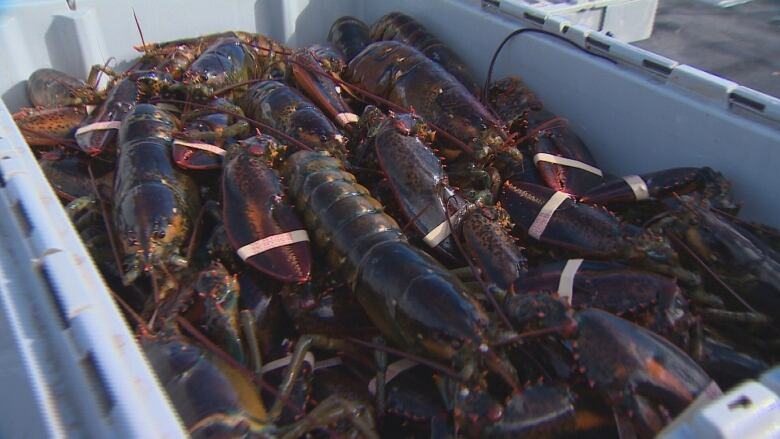Amid rising tensions, Canadians lobster exports to China hit another roadblock
It's the 2nd major disruption this week for the $457M export market

Canadian businesses that export lobster to China have run into another border roadblock.
On Friday, Chinese importers started demanding a signed declaration that Canadian live and processed lobster is free of COVID-19 before it can enter China.
"It's a bold thing to ask and we as Canadian exporters should push back," says Stewart Lamont of Tangier Lobster in Nova Scotia.
His company flies lobster to mainland China.
Lamont has refused to sign the declaration, which makes Canadian companies liable in the Chinese court system if there is a problem.
"It's the assumption of the risk issue which concerns me. I'm very confident we are shipping non-COVID-19 product," he said.
"I really don't want to be subject to the whims of the Chinese court system. There are two Michaels in jail in mainland China who could speak to that better than I can."
The latest impediment
The financial stakes are high in Atlantic Canada.
Last year, companies mostly in Nova Scotia shipped live lobster worth $457 million to China.
This is the second major disruption in one week.
Chinese authorities started doing random testing for COVID-19 on imported food,including lobster, after a recent outbreak was traced to a cutting board used for salmon at a market in Beijing.
Companies in Nova Scotia cancelled shipments rather than risk delays of up to 36 hours waiting for test results when the perishable product arrived in China.
"The effect of these inspections is that the live-shippers just simply don't want to ship there to take the risk," Geoff Irvine of the Lobster Council of Canada said.
Industry seeking appropriate response
Now the Canadian industry is dealing with the new demand from Chinese importers, not the Chinese government, for a guarantee that lobsters are free of COVID-19.
"We are trying to figure out the appropriate response," Irvine said Friday.
After the Beijing outbreak, China told trading partners,including Canada,it wants assurances that countries "follow measures to prevent any COVID-19 contamination of food products during food production."
The Canadian Food Inspection Agency said Friday it is communicating with the General Administration of Customs of the People's Republic of China to provide the requested assurances with respect to Canadian exports.
"There is currently no scientific evidence that food or food packaging is a likely source or route of transmission of COVID-19," spokesperson Christine Carnaffan said in an email response Friday.
"In addition, there have been no confirmed cases of food or food packaging being associated with the transmission of the virus."
Province monitoring situation
The province is echoing that line of thinking.
"We are not aware of any science to support these requirements,"spokesperson Tracy Barron said in an email to CBC News.
"We encourage the Canadian Food Inspection Agency to engage Chinese officials to find a science-based resolution to this matter as soon as possible."
She said the province is in contact with GlobalAffairs Canada and the Canadian Food Inspection Agency to understand and implement the requirements.
"We are in close touch with our local industry and shippers to understand the impact this is having on exports," Barron wrote.
Hoping for compromise
Lamont is aware of the escalating tensions between Canada and China.
Espionage charges were laid today against Michael Spavor and Michael Kovrig in retaliation for the pending extradition of Meng Wanzhou, a top executive at Chinese tech giant Huawei. Shewas arrested by Canadian authorities in Vancouver at the request of the U.S. governmentoverfraud charges related to trade with Iran.
But Lamont is still hoping for middle ground despite the diplomatic quagmire.
On Friday, he offered to a customer a declaration that his company was concerned about the issue and adopting measures in its plants to offer the safest environment possible.
"We have a client who says that will be sufficient under the circumstances."
"I think we should be a little bit cautious. China desperately needs our seafood. We desperately need them as a market. There should be ways we can do business without signing our lives away."












_(720p).jpg)


 OFFICIAL HD MUSIC VIDEO.jpg)
.jpg)



























































































